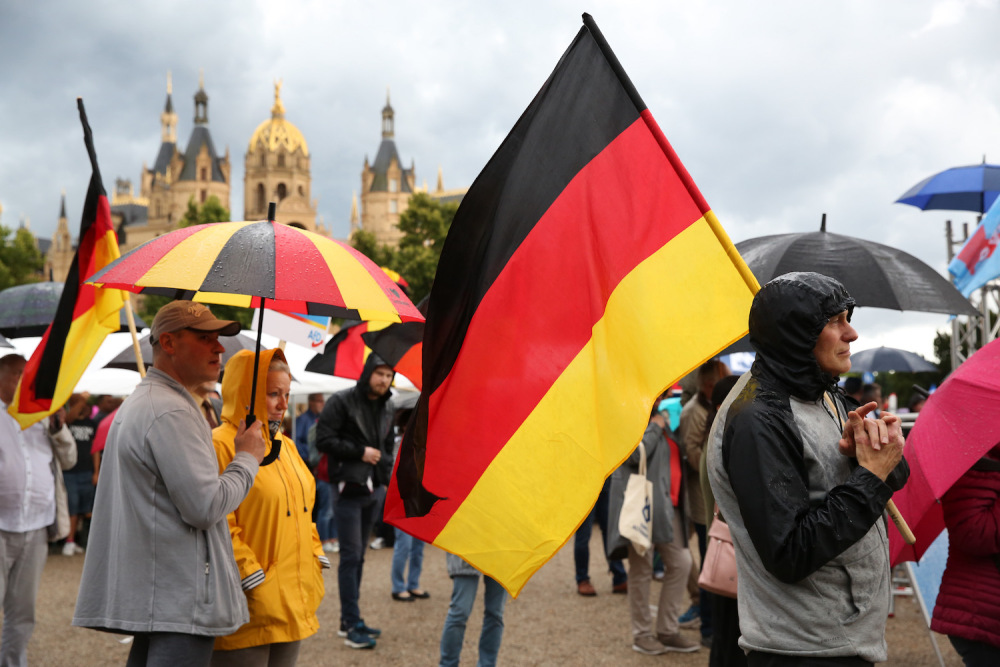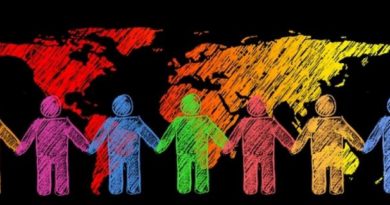Germany Braces for Election Disinformation on Social Media

BERLIN—One Saturday last month, thousands of anti-lockdown protesters stormed my quiet neighborhood, crashing into the weekly farmers’ market with signs discouraging vaccinations against COVID-19. But their concerns appeared to go beyond supposedly overreaching public health measures. One demonstrator pushed a newspaper into my hands with a front page declaring the protests were “rising up against the totalitarian and possibly genocidal tendencies of governments.” Their grievances were with the state itself.
Germany has won global praise for its handling of the pandemic. But its coronavirus-denying conspiracy movement, which has documented links to the far-right, has become increasingly radical in the past year. Last August, protesters attempted to storm the German parliament in Berlin, months before the Jan. 6 riots in Washington. In Kassel, in the German state of Hesse, anti-lockdown protests that turned violent captured media attention in March. Many members of the movement have a deep-seated mistrust of institutions. Online and at protests, they share conspiracy theories, such as the Great Reset, which contends that COVID-19 is a ploy to introduce an authoritarian world government.
This aggressive conspiracy movement could seek to disrupt Germany’s federal elections on Sept. 26. Some far-right figures are already seeding narratives reminiscent of former U.S. President Donald Trump, saying the results could be tampered with. The behavior of some protesters has left observers concerned about the impact of a sizable minority that seems so disillusioned with Germany’s democracy.
BERLIN—One Saturday last month, thousands of anti-lockdown protesters stormed my quiet neighborhood, crashing into the weekly farmers’ market with signs discouraging vaccinations against COVID-19. But their concerns appeared to go beyond supposedly overreaching public health measures. One demonstrator pushed a newspaper into my hands with a front page declaring the protests were “rising up against the totalitarian and possibly genocidal tendencies of governments.” Their grievances were with the state itself.
Germany has won global praise for its handling of the pandemic. But its coronavirus-denying conspiracy movement, which has documented links to the far-right, has become increasingly radical in the past year. Last August, protesters attempted to storm the German parliament in Berlin, months before the Jan. 6 riots in Washington. In Kassel, in the German state of Hesse, anti-lockdown protests that turned violent captured media attention in March. Many members of the movement have a deep-seated mistrust of institutions. Online and at protests, they share conspiracy theories, such as the Great Reset, which contends that COVID-19 is a ploy to introduce an authoritarian world government.
This aggressive conspiracy movement could seek to disrupt Germany’s federal elections on Sept. 26. Some far-right figures are already seeding narratives reminiscent of former U.S. President Donald Trump, saying the results could be tampered with. The behavior of some protesters has left observers concerned about the impact of a sizable minority that seems so disillusioned with Germany’s democracy.
Although there are no signs yet of plans for outright violence, disinformation could play a role during the elections, in which German Chancellor Angela Merkel will not seek a fifth term. False claims about fraud have already circulated during local elections this year. In the eastern state of Saxony-Anhalt, where the far-right Alternative for Germany (AfD) party has a strong base, polls predicted the party would increase its numbers during state elections on June 6. When the AfD lost 3.5 percentage points of its share, #Wahlbetrug—or “election fraud”—began trending on Twitter, fueled by far-right figures and AfD members.
During local elections, a variety of disinformation tactics quickly spread online, which could be replicated during the general elections. Alice Echtermann, editor of fact-checking site Correctiv, said her team noticed a false-flag account: a user who claimed they were tampering with votes in favor of the Greens party. Although the account was quickly suspended, screenshots circulated widely, including by a former AfD politician. Another viral post contained a video by one of Germany’s most popular far-right bloggers, who said mail-in ballots were being tampered with and final vote numbers were wrong.
“We pointed out that his analysis didn’t really make sense,” Echtermann said. “We showed that he had no proof. But it’s often difficult with these figures because they already know that they don’t have any proof.”
Figures with large followings appear willing to spread such disinformation, and there is a sizeable audience who is sympathetic to election fraud narratives. Although not unique to Germany, a lack of media literacy makes both younger and older voters susceptible to this disinformation, albeit in different ways. Older generations who didn’t grow up with social media struggle to identify a source’s trustworthiness, and some younger people can be disconnected from mainstream news sources.
Experts have raised concerns that exact disinformation tactics employed around the federal elections will be difficult to predict and could spread faster than anyone is able to debunk them. Echtermann said her team encountered claims of election fraud during Germany’s 2017 federal elections but warned they could be more prominent this year, especially after Trump’s reaction to the 2020 U.S. election.
Many members of the German far right view the former U.S. president as a relatable figure—and as someone who is on their side. According to many QAnon followers in Germany, Trump was supposed to help liberate the country from its government. Some protesters even said they attempted to storm the German parliament because they thought he was in Berlin that day. Rocío Rocha Dietz, co-founder of the think tank CeMAS, which monitors the German radical right, echoed Echtermann’s concerns about the likelihood of election fraud claims around the federal elections. “Trump has been a really important figure for conspiracy ideologues here in Germany,” she said.
CeMAS recorded a spike in discussions of election fraud on German channels around the U.S. election last November, and it has seen another rise in activity ahead of Sept. 26. Supporters tend to share stories about Trump without any German context—an apparent dog whistle about election interference. They have also echoed theories that pandemic restrictions will interfere with the vote and mail-in ballots can’t be trusted. A public Telegram group created for members of the public to volunteer as unsanctioned election observers has seen more than 3,000 members join, including several influential far-right figures.
Disinformation tactics don’t necessarily help far-right parties perform better in elections. Although conspiracy narratives play an important role in furthering their ideologies, they also create a contradiction: Claims that votes are being suppressed for far-right parties ultimately send a message to supporters that voting is ineffective. In 2017, the AfD used the issue of migration to increase its vote share to 12.6 percent. Ahead of Sept. 26, the party is polling at between 11 and 12 percent, perhaps in part because it lacks a rousing cause. Election conspiracies are unlikely to appeal to many voters beyond its core base.
Meanwhile, Germany is investing in resources to combat organized disinformation about the elections, including simply encouraging people to vote. One program, Unmute Now, runs projects aimed at encouraging voter participation across the country. One city has added “Don’t forget to vote” messages to nightclub entry stamps as part of the program. Unmute Now co-founder Noah Schöppl attributes low voter turnout among young people to disillusionment. “They still believe in democratic ideals,” he said. “They are just disappointed with the political realities they encounter”—those realities being a lack of representation by traditional parties and a lack of inspired vision for Germany throughout the Merkel era.
It is difficult to predict whether disinformation will be confined to social media or manifest in physical protests on Sept. 26. Ironically, although Trump’s promotion of conspiracy election narratives may have provided fuel for others around the world, they have also made officials more aware of the damage they can cause. Observers are likely to be on high alert around the elections—a development Echtermann said was a positive change. “I don’t think all these people just became conspiracy theorists [because of the pandemic],” she said. “I think it was always there but was more hidden. Now, it’s public.”
*** This article has been archived for your research. The original version from Foreign Policy can be found here ***

